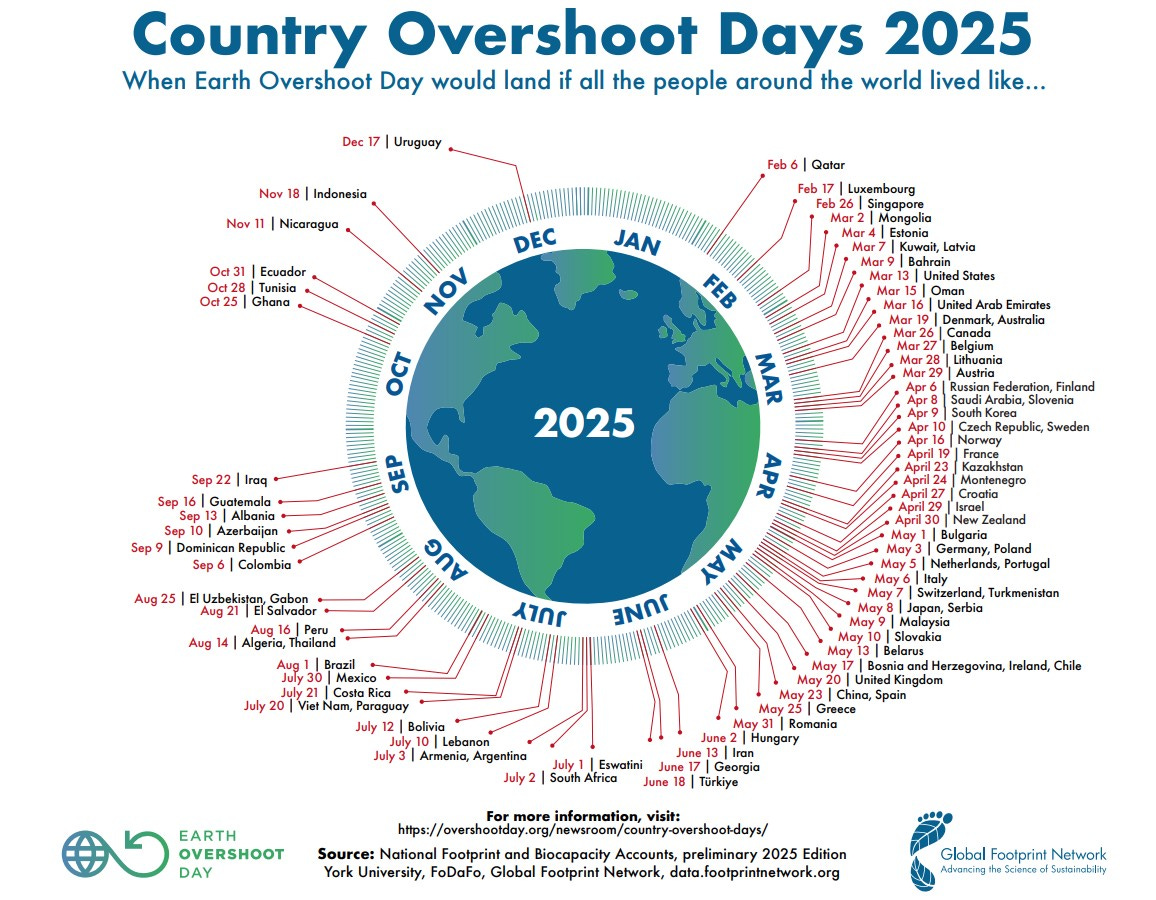Uruguay
The best resource managing country on Earth.
A country’s overshoot day marks the date when Earth Overshoot Day would fall if all of humanity consumed at the same level as the people in that country. Check out the work of the people at the Global Footprint Network for more information.
The country overshoot days for 2025 are based on the preliminary 2025 edition. For most countries, the dates reflect the 2023 situation—the latest data point currently available. The full 2025 edition is expected to be released on Earth Day 2025 (April 22) and is being prepared by York University’s Ecological Footprint Initiative.
If you look closely, you can likely find your country. Some countries cannot be found on the chart, but that is most often due to extreme poverty.
If you live in Qatar, your country’s Earth Overshoot Day is February 8th. Now that is some intense resource use. Qatar is speedrunning the Apocalypse.
The date for the United States is March 13th, Australia March 19, Canada March 26, New Zealand April 30, and United Kingdom May 13. That’s not very sustainable resource use from most of my readers - myself included.
But if you look at the end of the year, you will see Uruguay hanging out on December 17th, almost making it to the end of the year.
What is it about Uruguay?
Uruguay only has about 3.4 million people packed into an area about the size of Washington State in the United States. Washington state is the home of about 8 million people, more than twice Uruguay’s size by population.
Uruguay has one of the lowest levels of income inequality in Latin America with a Gini coefficient of .40 which is just behind the United States Gini coefficient of .413. A rating of 1.0 means that one person has all the wealth in a country, and a rating of 0 would mean that all wealth is perfectly evenly distributed. The government in Uruguay has invested heavily in education, healthcare, and the minimum wage is indexed to inflation. The top marginal tax rate is 36%. The rich are not soaked, but they pay their fair share.
Uruguay is one of the happiest countries in Latin America, because it has a strong social safety net and a high standard of living. It still ranks well behind Western European countries in terms of happiness. Per capita income and GDP are the third highest in Latin America at about $22,500 per year for income and about $31,000 in GDP.
Uruguay is not pristine in its energy use, as oil still makes up about 43% of the country's energy supply according to the IEA. In 2008, Uruguay started the transition to renewable power. The country boasts one of the world’s greenest electricity grids, powered by 98% renewable energy, mostly hydropower and wind.
Things are not perfect. Growth and poor planning recently resulted in the depletion of the main reservoir that supplies the capital, Montevideo. There have also been complaints that the country’s leaders prioritized water supplied to international business over those of their people.
Just a few years ago, large oil and gas reserves were discovered off the county’s coast, and there are now plans to exploit those resources.
Still, it says something that a country has environmental problems, just like other countries, but prioritizes well-being and “green” living enough that it almost falls off the Earth Overshoot calendar completely.
Ask yourself what your country could do to move it’s Earth Overshoot Day to December, or off the calendar all together. Maybe they should give the folks in Uruguay a call.
Degrowth is only part of the answer. Uruguay is growing, as GDP grew about 3.8% over the past year.
If most industrialized countries just copied Uruguay’s policy portfolio, while taking steps to implement modest degrowth policies that are quite popular (like a four-day workweek and universal basic income) maybe we could do away with the Earth Overshoot Day calendar altogether.
In case you were wondering, I currently have zero subscribers from Uruguay. Maybe that’s because they have figured this all out.



"Ask yourself what your country could do to move its Earth Overshoot Day to December, or off the calendar all together. Maybe they should give the folks in Uruguay a call."
Not only do we not have to wait for "your country" to act, if you mean government policy, the fastest way to lead them to act is to act ourselves. I know someone in Manhattan with a lower footprint than Uruguay's per capita, who made the video here: https://spodekmethod.com. The biggest source of resistance is other people saying they can't do it, not realizing they'll be happier. Luckily no one told Uruguayans! They can do it and so can we.
What is a country but all of its citizens?